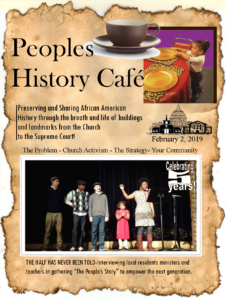
The importance of Black History Month
Community, Front Page February 1, 2019, Comments Off 239Black History Month is observed by the United States, the United Kingdom, Canada, Germany and the Netherlands. Abraham Lincoln and Frederick Douglass have birthdays in the month of February – the 12th and 14th, respectively – both of which were already celebrated by the black community before the official establishment of Black History Month. The month of February was intentionally selected to include these men’s birthdates, a tradition dating back to Carter G. Woodson’s establishment of Negro History Week in February 1926, which celebrated both Lincoln and Douglass.
In 1915 in Chicago, Il., Woodson, a University of Chicago alumnus, launched an initiative for the study of black history and culture following Illinois’ celebration of 50 years of emancipation. He founded the Association for the Study of African American Life and History (ASALH), which successfully petitioned for the first Black History Month in 1976.
Representation in public schools
Some people are critical of Black History Month. Critiques include arguments ranging from, “It is unfair to devote a whole month to just one group,” to, “It allows us to discount the history and achievements of African Americans for the other 11 months.”
As much as some argue that achievements by African Americans should be celebrated year-round, this is not a reality. The focus on the achievements of black people in our country during the month of February is useful to draw special attention to figures from history that might otherwise be overlooked.
Part of the tendency for mainstream society to overlook African Americans’ successes is due to a lack of emphasis on African Americans’ achievements in American public schools. This can clearly be seen in the teaching of literature in public schools. Many students have either read few or no black authors by the time they reach university. Most universities offer classes which focus on African American literature, such as the one offered at Drury and taught by Dr. Richard Schur.
When asked about why Black History Month is important to recognize, Dr. Schur stated, “It can be so hard to get institutions to focus on diversity and this is one way to do it.”
How is it that American students are required to read novels for well over a decade, yet encounter – at most – a handful of black authors? This is especially concerning when compared to the number of white, male, American authors that the average student must read in high school literature classes. Why does it take a specialized class to study these influential people and their works when they should be just as integrated as white authors in the literary canon?
Marley Dias, 14, who is a young social activist and author, captured this sentiment when she stated, “We only read books about white boys and their dogs.” Dias began a campaign, called #1000BlackGirlBooks, to spark discussion about books by black authors, especially black women.

Minister Christine Peoples. Photo via Christine Peoples.
The Peoples History Cafe
Minister Christine Peoples is also concerned by the lack of representation for students of color in schools. This led to Peoples’ creation of a local, annual event known as The Peoples History Cafe.
For Black History Month, they are hosting an event at the Midtown Carnegie Library with the support of the Drury History Club and faculty member Dr. Michael Verney. The event will take place this Saturday, Feb. 2, from 11 a.m. to 2 p.m.
When asked to define The Peoples History Cafe, Peoples stated, “In a nutshell, it’s educating together. I have a big heart for community, and when it comes to Black History Month, there’s issues around that for the children. And so, I knew that I had to create a public celebration, and thanks to Jim Schmidt, the associate director of the Greene County Libraries, this was made possible.”
The Peoples History Cafe is another way to bring faculty, students, and parents together to celebrate and educate during Black History Month with interactive exhibits and dialogue. It is meant to be a place for communication and education for everyone.
It is no mistake that The Peoples History Cafe takes place during Black History Month. Peoples wants students of color to have a place where their identities are fostered, and their history celebrated. Peoples stated, “There are so many students that just don’t get exposed to curriculum and books in school that reflect them. They haven’t found cultural responsive celebrations in the community until now with The Peoples History Cafe. The foundation of the event is specifically geared to support social and emotional skill sets to encourage the identities of youth through community and family history.”

Photo via Christine Peoples.
Representation in homogenous cities
Recognizing this mission is critical, especially in cities across America like Springfield. With a population around 167,000, 89 percent of Springfield residents are white while only four percent are black, according to the World Population Review. Finding representation and camaraderie in such a homogenous city is not easy.
New movies such as “Moonlight,” “If Beale Street Could Talk” and “Black Panther” are providing more avenues of expression and exposure for black casts, producers and directors, challenging the preconceived – and incorrect – notion that these types of movies do not appeal to everyone because they do not reflect the majority of the audience. Boots Riley’s “Sorry to Bother You” made strides toward representation in the sci-fi genre, while Jordan Peele’s horror creations challenge traditional tropes and incorporate fresh perspectives.
Celebrating black history on campus
BUIC is an organization at Drury that, according to Treasurer Autumn Green, “Create[s] a known presence of black culture, community and excellence on Drury Campus.” BUIC stands for Black United Independent Collegiate. The organization promotes the experiences and history of black students here on campus.
When asked why she believed that Black History Month was important, Green responded, “Black History Month is so important because it honors what our ancestors have done for the African American community and the sacrifices they have made for us to live the lives we are living now. It’s a month of appreciation and giving them recognition, as well as sharing their accomplishments with other cultures: making sure they are not forgotten in history.”
There are also those at Missouri State University’s (MSU) campus celebrating Black History Month. MSU is hosting “Sankofa: Exploring the Diaspora,” a series of screenings, dinners and discussions over the course of the month.
Black History Month places an emphasis on the history of African Americans which is often ignored. While black history and achievements should be celebrated every month of the year, Black History Month is useful as a specific time frame to encourage celebration of this history which may otherwise be overlooked all year round.
Of course, the month of February is not the only time that one should seek to learn more about these topics. Black history should not be relegated to a single month: Its impact on the country is far more expansive and must be understood by all citizens. It should not be treated as an elective. Black history is not an additive, but a crux on which American society exists. Our past cannot be understood without it.
Written by Lauren Barclay and Maclen Johnson.